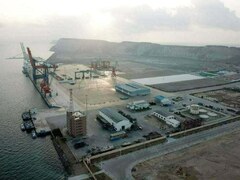 TOKYO: Japan's trade deficit in November shrank by nearly a third from a year ago, helped by higher exports and falling oil bills, although the volume of shipments to foreign markets remained weak, official data showed Wednesday.
TOKYO: Japan's trade deficit in November shrank by nearly a third from a year ago, helped by higher exports and falling oil bills, although the volume of shipments to foreign markets remained weak, official data showed Wednesday.
The figures come after Japanese Prime Minister Shinzo Abe swept weekend elections he had billed as a referendum on his programme to kickstart growth.
The two-year old policy blueprint took a hit after an April sales tax rise slammed the brakes on the world's third-largest economy, which slipped into recession during the third quarter.
Abe's plan had sharply weakened the yen, a plus for the profitability of exporters such as Toyota and Sony, but the currency's dive has not translated into a big jump in export volumes.
On Wednesday, the finance ministry data showed the November trade deficit came in at 891.9 billion yen ($7.6 billion), down 31.5 percent from a year ago and below a median forecast of 996 billion yen in a survey by Japan's leading Nikkei business daily.
The value of exports rose 4.9 percent, largely on shipments of electronic components, optical equipment and machinery, but volume was still down 1.7 percent.
Imports fell 1.7 percent, the first downturn in three months, as the cost of crude oil and petroleum purchases plunged.
Energy costs have weighed heavily on Japan as the resource-poor country struggles to plug a yawning energy gap after the 2011 Fukushima crisis forced the shutdown of nuclear reactors that once supplied more than a quarter of its power.
That problem has been exacerbated by the yen's sharp fall -- it is currently at a seven-year low against the dollar -- which hiked the cost of imports purchased in foreign currencies.
"The drop in the trade shortfall in November should be followed by a further narrowing in coming months as lower oil prices will reduce the import bill," said Marcel Thieliant, Japan economist at Capital Economics.
But "import volumes... remain well below the peaks reached ahead of the consumption tax hike. Admittedly, the weakening of the export climate index suggests that export volumes will expand at a slower pace in coming months".
The trade picture is expected to remain cloudy amid tepid growth in the eurozone and a slowdown in China, a key trading partner for Japan.
Exports to the European Union fell 1.3 percent in November from a year ago, while US-bound shipments rose 6.8 percent. China-bound exports inched up 0.9 percent, the data showed.
Last week, Fitch ratings agency placed Japan's sovereign credit on Rating Watch Negative, warning that a plan to delay another consumption tax rise next year would put the government's objective of reducing an eye-watering national debt at risk.
The warning came about a week after Moody's downgraded Japan's rating, citing "rising uncertainty" over the debt situation and Abe's faltering efforts to kickstart the economy, which shrank 0.5 percent between July and September after contracting 1.7 percent in the previous three months.





















Comments
Comments are closed.